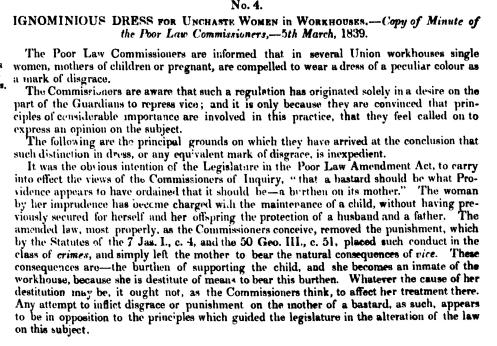Were the mothers of illegitimate children humiliated in the Victorian workhouse? Evidence would suggest that workhouse management were keen to make an example of who they regarded as ‘unchaste’ women by reducing their food allowance or making them wear clothes that would mark them out. However the Poor Law Commissioners in London issued a statement in 1839 outlawing this practice.
This ruling did not appear to deter Swansea Union, as in 1850, the poor law guardians discussed whether ‘a certain class of Females’ should be made to wear a special badge and given a diet of ‘inferior description’. These women had been admitted into the workhouse from ‘profligate habits’ were either pregnant, or had borne two or more children, which led the guardians to believe that they were undeterred by the threat of the workhouse.
The Poor Law Commission did not agree with these practices. However this was not because of any tolerance towards unmarried mothers. Rather, the 1834 Poor Law Amendment Act had declared via the infamous ‘bastardy clauses’ that a ‘bastard should be what Providence had ordained that it should be – a burthen on its mother’ and ‘placed such conduct in the class of crimes and simply left the mother with the consequences of vice’. Thus, the Commissioners felt that the woman, by her own ‘imprudence’, had been punished by bearing this ‘burthen’ alone and it ‘ought not to affect her treatment in the workhouse’.
In 1844, the law was changed to allow unmarried mothers to apply to magistrates for ‘affiliation’ orders which, if paternity was proved, the putative father would be obliged to maintain the child financially.
It is worth mentioning an extract from the Inquiry into the Rebecca Riots in 1844. One witness related how the ‘bastardy clauses’ in the 1834 Poor Law Amendment Act affected women when his female employees told him:
‘it is a bad time for the girls, Sir, the boys have their own way’.
Sources used:
Report of the Commissioners of Inquiry for South Wales, 1844, cmd. 531, 177.
Appendix to Sixth Annual Report of the Poor Law Commissioners, 1840, cmd. 253, 56.
West Glamorgan Archives Service, U/S 1/1, Guardians Minutes of Meetings, 20 June, 4 July 1850.